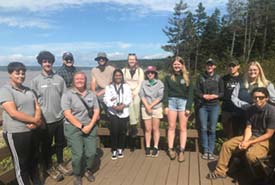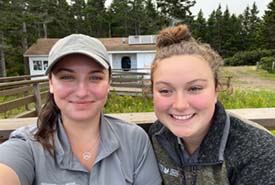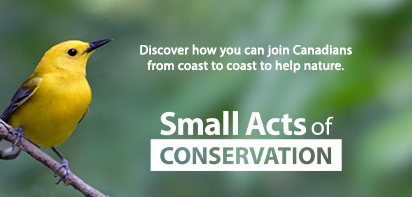Interns of Atlantic Canada

Atlantic Interns gathering at Johnson's Mills Nature Reserve (Photo by NCC Staff)
This year, the Nature Conservancy of Canada (NCC) welcomed 16 interns across Atlantic Canada in conservation, biology and communication roles. Many grew up around Atlantic Canada and are familiar with the wildlife and habitats of the region, while others come from different provinces in Canada and different countries.
All interns entering the organization receive training at the beginning of their work term. Academic knowledge also plays an important role in the learning process. While some interns return to university in the fall, others plan on expanding their field of work and finding more ways to help protect Canada's wildlife.
This summer, the interns visited many nature reserves throughout Atlantic Canada. Some days, they battled mosquitos and horseflies, and other days they enjoyed boat rides to beautiful scenic islands. But the interns were ready to tackle new tasks and learn, no matter which province they were located in.
New Brunswick
From planning volunteer events to recording critical observations of different properties, the interns helped bring many projects to life. Conservation Volunteers events are important because they allow individuals outside the organization to gain new skills and give a helping hand to NCC staff. As such, a lot goes into planning safe and productive events, and Caroline Blakely, our New Brunswick engagement intern, did not disappoint with coordinating safe and productive events. After her internship this summer, Caroline will be completing her master's in biology at the University of New Brunswick.
While field work is not always easy, it is a rewarding experience. And it’s even more rewarding and memorable when it happens at Musquash Estuary, NCC’s largest nature reserve in Atlantic Canada. Home to a variety of ecosystems such as bogs, marshes and forests, Musquash Estuary connects different habitats and provides much biodiversity. To ensure the area was thriving and maintained, our interns looked for signs of property damage by ATVs, the presence of debris and garbage, invasive plants and illegal tree cutting. These monitoring projects may sound simple, but they consume a lot of effort and time.
Field days are also full of adventures. Our interns came across new plants and animals that they had not seen before. “I am lucky to have visited exciting new nature reserves this summer. I was able to see my first ever smooth green snake in person,” says Bailey Brewer, one of the conservation interns in New Brunswick.
Johnson’s Mill’s Shorebird Reserve and Interpretive Centre

Jordan Myles and Emily Landry at Johnson's Mills Nature Reserve (Photo by NCC Staff)
Every year, NCC’s Johnson's Mills Shorebird Reserve and Interpretive Centre on the Bay of Fundy, New Brunswick, welcomes interns to monitor the migratory shorebirds travelling to South America. The interns act as interpreters on site, ready to look after some of the 250,000 shorebirds that migrate through the bay of Fundy each year. With the arrival of birds, the interpreters ensured that the semipalmated sandpipers could roost on the beach without any disturbances. These birds take their time during low tide to get nutrients from the mudflats before travelling for 5,000-6,000 kilometres to South America. As the tide rises and mudflats disappear, the shorebirds enjoy a quick nap on the beach, returning to feed once the tide recedes.
Interpreters at Johnson's Mills are an essential point of contact with the public. On a regular day, they could see and interact with around 200 visitors. Our interns are trained to share important information about the shorebirds and the area with visitors.
Thanks to the support from the NB Wildlife Trust Fund and the Environmental Trust Fund, NCC can continue providing summer internships every year for those interested in caring for migratory shorebirds. The efforts made by our interns created a pleasant experience for people and shorebirds visiting the Johnson’s Mills Nature Reserve
Nova Scotia
Like New Brunswick, Nova Scotia also holds many Conservation Volunteers events over the summer. Our engagement intern, Emma Willoughby, a Global Development and Education student at Queen's University, handled these events smoothly. Emma also brought awareness about the critical support needed for shorebirds in the province through her interview with Global News.
Other interns, like Joe Schell, the Dr. Bill Freedman intern, explored the province and discovered new landscapes they had not seen before, like Spencer's Island in Cumberland County. Leah Riehl, another conservation intern, recalls the day her team found piping plovers on a beach in Port Joli, Nova Scotia. "We had heard of piping plovers visiting the area earlier in the summer, but they have not been seen on this beach in seven years, so we were unsure we could find any,” she says. “As we made our way along the shore, we came across a pair of plovers and two chicks! It was incredible, and we were ecstatic!"
In addition to the memories of these field days, interns can bring awareness to others in the community.
Prince Edward Island
Where most people travel for a summer vacation was Alec Jardine’s office for the summer. Alec, a conservation intern with Prince Edward Island, recently graduated from Holland College with a diploma in wildlife conservation technology.
Over the summer, Alec helped bring awareness to the public on how to care for coastlines on the island. The PEI stewardship team set up an educational presentation for the public on Lakeside Beach throughout July. Close connections with this community and having lived on St. Peter’s Harbour Lake motivated him even more to help make this project happen. Another highlight of his summer was doing a baseline inventory on the newly conserved Five Houses Woodland Nature Reserve. Baseline inventories help NCC learn what features and species are present on a property. The Five Houses Woodland Nature Reserve is home to valuable and rare species, such as yellow lady's-slipper, rare lichens, old-growth forest with mature sugar maple, American elm and white ash.
Alec’s experience as a property steward on St. Peter's Harbour Lake Run Nature Reserve with NCC was the catalyst in applying for a summer internship. Property stewards volunteer their time to help NCC maintain different properties and nature reserves. “This fall, I will be attending the Atlantic Police Academy at Holland College. I will be taking the Conservation Enforcement program to become a conservation officer! I will be able to use many of the skills I have learned from my summer at NCC — like diligent report writing and educating members of the public about conservation issues” he says.
Newfoundland and Labrador
Thanks to the generous support of our funder, Cenovus, the Newfoundland and Labrador team was able to onboard two conservation interns this summer, Chirathi Wijekulathilake and Triina Voitk. Their team may have been smaller than other provinces, but their efforts were equally valuable. Originally from Sri Lanka, Chirathi has been enjoying her time in Newfoundland and Labrador. “Seeing all the colours change as the seasons change is one of the best parts of being in Canada,” says Chirathi.
With Chirathi’s bird identification skills and Triina’s advanced knowledge of plants, the pair took on any challenges that came their way. Additionally, their completion of a baseline inventory for the newly acquired property along the Salmonier River was a significant help.
“Working with NCC made me discover how so many different landscapes are tucked away within the province, and a collection of different species are nestled in each one. For example, during my time in the Codroy Valley, I learned much more about migrating bird species, where they nest, when and how to identify them,” says Triina.
“I had a great time during my internship; exploring and learning about conservation efforts in Newfoundland and Labrador was very eye-opening. I especially enjoyed every day we spent at the Grand Codroy Estuary, working on property monitoring, community outreach and prospective property inspections. The view of the Long Range Mountains from the Grand Codroy Estuary and all the lifer birds (a bird species when it is first seen and positively identified by an individual birder) I saw was one of the best memories of this summer,” says Chirathi.
Their summer with NCC may be over, but both interns are ready for a new beginning in their academic and professional careers. While Chirathi will defend her thesis for a master's in cognitive and behavioural ecology, an interdisciplinary graduate program focused on animal behaviour and behavioural ecology, at the Memorial University of Newfoundland, Triina will begin a short term as a stakeholder engagement coordinator.
While many interns have biology degrees, some, like Saba Mozaffari, the Atlantic communications intern, joined the organization with a psychology background. Saba began her role with NCC in 2021 and completed a second internship with the organization in 2022. Passionate about writing and creating content, Saba has been working on stories and social media content to bring awareness about the value of NCC’s efforts around the Atlantic region.
A psychology student at Saint Mary’s University, Saba knew the role was for her when she was given creative liberty and opportunities to grow. Working from her home office in Moncton, New Brunswick, she never felt lonely as her team was always available to provide guidance and feedback. “I am grateful to be a part of the team for a second term and feel lucky to have so much flexibility in my job. Working as a communications intern strengthened my writing and management skills, which are extremely important in my academic career.”
Interns are encouraged to apply for positions across the organization, no matter their educational background. NCC welcomes eager and ambitious individuals from all walks of life. NCC is thankful for the support from donors who have helped provide funding for this yearly program.




